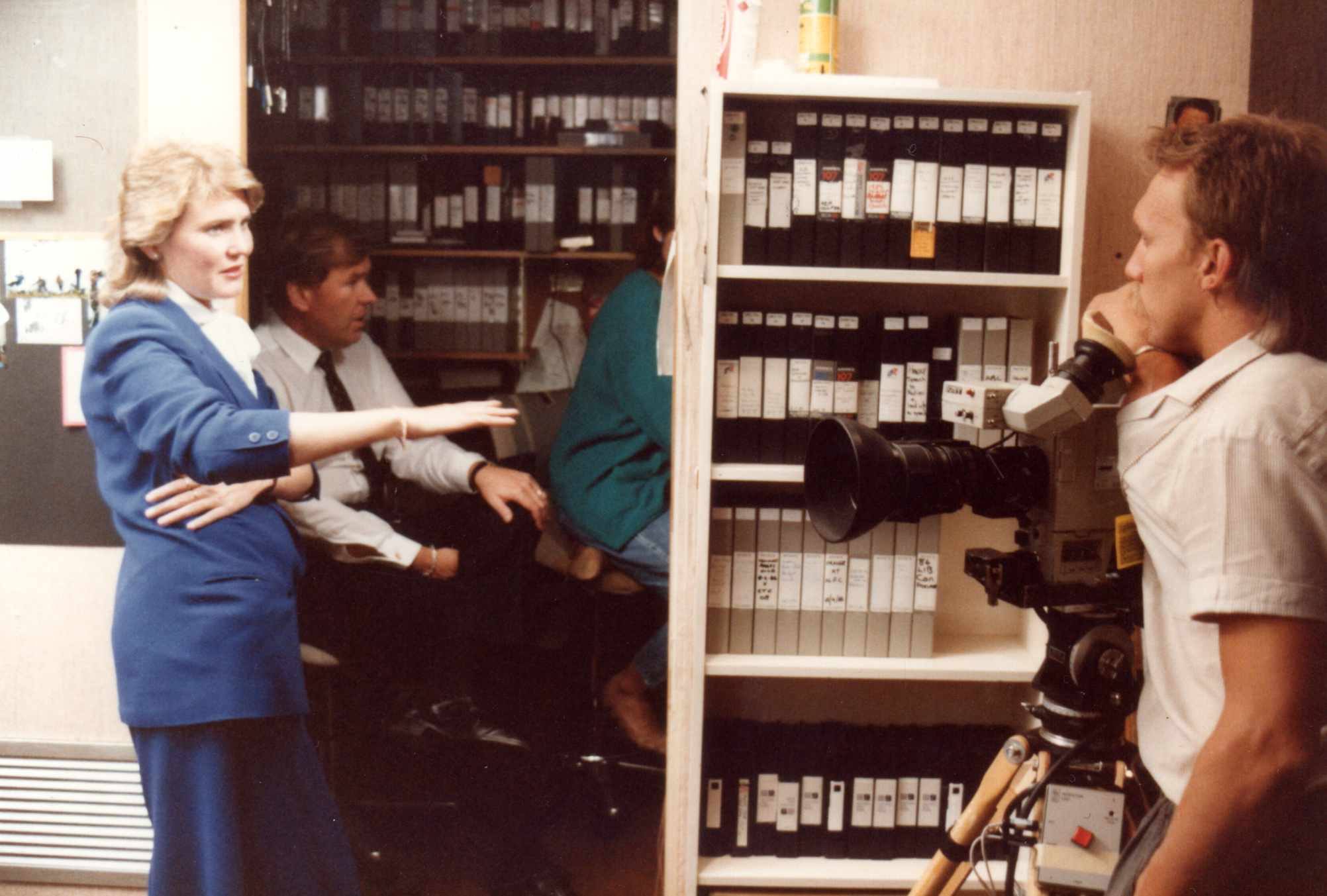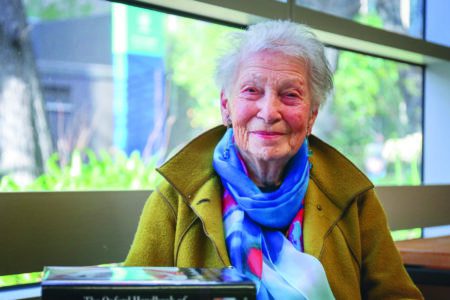When Jane Phelan woke from a stroke she had lost the ability to walk or talk. But then she found God – again – and hasn’t looked back.
By David Southwell
Sitting in class last year, Pilgrim Theological College student Jane Phelan had a question to ask lecturer Sean Winter but found she wasn’t physically able to.
Asking questions was once Jane’s job across a string of prominent TV journalism and talk show roles. However, since suffering a major stroke 26 years ago the once consummate communicator has often lived with the frustration of struggling to express herself.
“My speech will dip if I am tired or ill,” Jane says.
“I wanted to ask Sean a question, but I couldn’t get the words out. He picked up a chair and came over to me and said ‘what is it you want to know?’ And I couldn’t talk but I kept trying.
“The lecture was finishing at 12 noon and at 2pm he had to get a plane. But he sat there and said ‘I’ve got time’.
“And I felt that ‘I’m a person and he takes me seriously’. I felt buoyed by that.”
Jane later discovered she had been rendered mute by emphysema.
She blames this on the cigarette habit that was picked up and exacerbated in the smoke-wreathed newsrooms she worked in as an award-winning journalist for Channel 10, Nine and finally at the ABC. In between she also worked as a producer of Channel Seven’s Tonight Live with Steve Vizard talk show.
During her career Jane interviewed everyone from prime ministers to Hollywood stars, she was Nine’s US correspondent and even filled in as a guest host on the Graham Kennedy Coast to Coast late night show.
In 1993, Jane at the age of 35 was in what she considered her “dream job” as a reporter, executive producer and occasional anchor of ABC’s The 7.30 Report in Victoria.
“I had the world at my feet,” she says.
On 17 February of that year, Jane attended an Elton John concert with her mother and four sisters.Before the concert Jane suffered a “splitting headache”, but felt better after trying to walk it off along the banks of the Yarra, but eventually she took her seat beside her family inside the Melbourne Tennis Centre.
The last thing Jane remembers before the blackout was Elton on stage singing Don’t Let The Sun Go Down On Me.
When she woke up, nine days later, Jane couldn’t understand why she was in a room full of old people.
Jane was in Melbourne’s St Vincent’s Hospital having suffered a cerebral haemorrhage of such severity that her family had been warned that she might have extensive and permanent brain damage.
Coming out of the coma Jane had lost the ability to talk or walk.
Her right side was paralysed. “My right arm has never moved,” she says.
“Even the right side of my nose can’t feel anything while my left can. It is the same with my teeth.”
Initially Jane got around in a wheelchair, but can now walk unaided.
After a year in hospital Jane moved in with her mother until she felt confident to live by herself, which she now does.
“My right leg is coming on with physio but it’s dragging when I’m tired,” she says.
“It’s always the left side pulling the right to perform.”
Jane says her mental faculties have recovered well.
“It took probably a year to get my brain into gear,” she says. “My intellect is extremely good.”
At her first speech therapist session after the stroke Jane was shown a picture of a cow and asked what it was.
“I knew it was a ‘cow’, but I couldn’t get the word out,” Jane says.
“It was a heartbreaking moment for me, realising this is the future.
“I was once a TV reporter with a flair for putting pen to paper and making words dance. But now, nothing. It was well nigh impossible to see a way out of the torturous black hole I was living in. Depression and anger raged. I simply wanted to die.”
It took months for Jane to say a full sentence. Her sister Lisa, who is a primary school teacher, helped Jane learn to read again by starting with Kindergarten-level books. It was like learning a foreign language.
Jane says the biggest struggle through the long years of rehabilitation has been mental.
“You fire on but then often slip back a little,” she says.
“It’s very disheartening if you let it be. Despair and anger were the two most lived with friends that I had.”
Those feelings also extended to religion.
“After I had the stroke I was angry, angry at God, angry at everything,” Jane says.
“If he cared for me, he wouldn’t cut me asunder in the stormy seas of a stroke, would he? Although the truth was I had lost my God long ago.”
Despite growing up with a devout Catholic mother and even studying for a theology degree at university before swapping to arts, Jane found the tragic and traumatic events she covered as a TV journalist gnawed away at her faith.
One particularly indelible moment happened early in her career when she covered the 1983 Ash Wednesday Fires, near Macedon.
Jane and a camera crew were the first to find a grandfather and two small grandsons who burnt to death running for shelter.
“In my first year of journalism at Channel 10 I just couldn’t believe that the world was churning as it does without asking why doesn’t God do something?” Jane said
“By the time I was at The 7.30 Report I was fiercely agnostic.”
However, in the years following the stroke, Jane felt that she needed to answer the question: “Where the hell was God?”
She began attending church again and, in 2013, decided to do a three-day silent retreat run by the Jesuits.
“I thought ‘God, if you want me to know that you are God, fine. If you don’t I will go on my merry way,” she says.
“At the retreat I met this 80-year-old man, a gorgeous man, Jesuit priest Father John Doenau.
“He listened. Because my speech was really disappointing at that time he just sat there and he listened. My heart was changed.”
Jane calls John her “spiritual director” and still meets with him regularly.
“He has been a wonderful gift for me,” she says.
“He helps wash my tears away and binds my wounds.”
Jane decided to become a volunteer visitor at Corpus Christi Community in Greenvale, which she described as “an aged care facility for weary men”.
“I found from the first day the men there were as I have been – damaged inside and out – and I felt ‘I am home’. We were one,” she said.
In 2017, Jane thought it was time to study theology again.

Jane Phelan with Channel Nine colleagues Peter Harvey and Doug Ferguson in Parliament.
“I wanted to know how I understand God,” she said.
She enrolled in a Post Graduate Diploma of Theology at Pilgrim Theological College and has completed two units, both taught by Sean Winter.
Sean says at the time of Jane’s enrollment he talked to her at length about the challenges she faces but has found her to be a formidable student.
“She has a lively mind, is keen to think about issues of history and faith with a critical perspective and a journalist’s ‘eye’ for a good angle on the issues,” Sean says.
Jane is currently taking a semester off her studies but still comes into Pilgrim every week to read.
“There is a deep heart to people here,” Jane said.
“I don’t need to worry about who’s looking at me or that I limp. I am learning so many things about God that I’m happy. I’ve come home again.”
Jane says that though she still sometimes gets angry, she has found a new outlook on her life since the stroke.
“It certainly was from one night that I went from a great communicator to a mess who couldn’t get her words out,” she said.
“But it quietened me. It made me sit up. It’s taken me this long to understand that. It’s taken me a long time to realise that success and popular approval is nothing compared to Mum’s love and that of my family and good friends.”
As for how God could allow it to happen, Jane said she found the answer in her experience at the Jesuit retreat.
“It was as though God wrapped me in his arms and said ‘it’s OK’,” she says.
“I have found my God who is with me always.”


